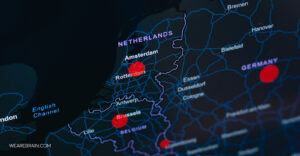Summary review: Deloitte tech trends 2020

Deloitte recently released their Tech Trends report for 2020, which gives insight into the newly identified key players and driving forces behind the world’s developing business and digital landscape. Some trends are direct responses to challenges within the IT sphere, while others are focused specifically on the tech of larger enterprise solutions. These trends are touted to power significant disruption and transform businesses of the future in new and unpredictable ways.
The report is dense and crammed with loads of insight and case studies, so for those looking for a summary of the report, your friends at WeAreBrain have delightfully obliged. Here’s our summary review of Deloitte’s top Tech Trends of 2020, and beyond. If you want more detail, be sure to read the full report.
Macro technology forces
According to Deloitte, the 9 macro technology forces that form the backbone of business innovation and transformation are digital experience, analytics, cloud, digital reality, cognitive, blockchain, the business of IT, risk, and core modernisation. For this year’s report, Deloitte shows how enterprises are using these macro forces specifically, and identifies how they’re shaping the tech trends that will most likely go on to disrupt businesses over the next year or two. In attempts to harness the true power of these macro technology forces, business leaders are beginning to explore how they intersect and build upon each other in order to create more value than the sum of its parts.
Businesses are also discovering new ways to manage macro technology and the technology function as they become more familiar with each process and how it relates to the broader IT landscape. While businesses over the world are understanding and thus utilising macro technology further, it is also playing an important role in laying the foundation to handle emerging technologies of the future, such as ambient experience, exponential intelligence, and quantum.
Read the full article here.
Ethical technology and trust
Deloitte highlights the fact that a growing trend in global business is the realisation that every component of an organisation disrupted by technology is an opportunity to either win or lose the trust of their clients. The shift in mindset reveals that this new focus is not a result of a growing compliance or public relations issues, but rather a critical aspect to the future success of the business. Trust now becomes an all-encompassing endeavour to ensure that an organisation’s technology, processes, and people, are working together to create and keep the high level of trust expected by clients and stakeholders.
Deloitte states that businesses are now rethinking how their products, services, and the way they handle their enterprise affairs build a relationship of trust (including data management, partnership ecosystems, and employee training, etc.). C-Suite players are promoting the importance of ‘ethical technology’, and are even at the point of creating tools to help people identify ethical dilemmas on how to use disruptive technologies. Organisations who are showing their commitment to ‘doing good’ by instilling their brand values and tech ethics throughout their business are realising the benefits and potential of building long-term trust with stakeholders and clients.
Read the full article here.
Finance and the future of IT
In recent years, strategising for technology has become a core component of leading business strategy in organisations, which has increased the demand for improved outcomes as a result of tapping into the power of business tech. Deloitte expects to see more IT and finance leaders joining forces to develop flexible approaches for innovating and operating at the speed of Agile. IT will need the support of finance to rethink governance of technology innovation, adapt to Agile methodologies, and secure creative capital.
Although transitioning to new finance, budgeting, and accounting processes that support innovation will likely take time to get to the point where it is commonplace, there are strong incentives for businesses to find ways to fund innovation. Companies that find themselves at the forefront will be the first to enjoy the competitive advantages that arise when finance funds innovation through Agile’s accelerated pace.
Read the full article here.
Digital twins: Bridging the physical and the digital
Upping the ante on the virtual model, businesses are now able to utilise highly sophisticated simulation and modelling tools, including power visualizations, improved interoperability and IoT sensors, to create simulations that are more detailed than ever before. Deloitte describes digital twins as a way to ‘enable you to collaborate virtually, intake sensor data and simulate conditions quickly, understand what-if scenarios clearly, predict results more accurately, and output instructions to manipulate the physical world’.
Furthermore, the digital twins model has the ability to ‘increase manufacturing efficiency, optimise supply chains, transform predictive field maintenance, aid in traffic congestion remediation, and much more’. Organisations which are pivoting from selling individual products to selling products in a bundle (or selling as-a-service) are the drivers and early adopters of using digital twins for example: ‘In the energy sector, oil field service operators are capturing and analyzing massive amounts of in-hole data that they use to build digital models that guide drilling efforts in real-time or in the healthcare sector researchers have created digital twins of the human heart for education and training. According to Deloitte, ‘the more refined this tech becomes, the more organisations will use it to optimise processes, make data-driven decisions in real-time, and design new products, services, and business models’.
Read the full article here.
Human experience platforms
The ability to utilise emotionally intelligent platforms to identify and incorporate emotional data at scale is one of the most important opportunities for companies in the coming years. Soon, businesses will meet the need of a growing demand for technology to better understand and respond to humans more appropriately. Until now, computers did not have the ability to correctly correlate events with human emotions, but innovators are ‘adding an emotional quotient (EQ) to technology’s IQ, at scale’.
Human experience platforms will soon be able to identify a human’s emotional state and the context informing it through the use of AI, human-centred design, and neurological research tech. The aim is to assist AI to better understand human needs and the drivers behind them in order to find an appropriate response.
Read the full article here.
Architecture awakens
Deloitte identifies that the science of technology architecture has never been more strategically important than now. Due to markets being disrupted by technology innovation, businesses need to rethink their approaches to architecture. They can begin this by evolving the role a technology architect plays. Deloitte expects to see more organisations move architects away from the planning table and more on the front lines, with more hands-on responsibilities. Technology architects will be entrusted with more responsibility for services and systems.
From this intervention, technology architects will naturally become more heavily involved in system operations and into software development teams that are designing more intricate tech. Deloitte urges companies to invest more in tech architecture as its strategic value becomes a competitive differentiator in the future digital economy.
Read the full article here.
Horizon next: A future look at the trends
Anticipation and early planning to cater and adapt to the tech of tomorrow will enable businesses to be the first to reap future rewards. A disciplined innovation program that is aligned with business strategy and a long-term technology landscape can help leaders chart a path to the next horizon.
Deloitte states their technologies of tomorrow succinctly: “Ambient experience, exponential intelligence, and quantum are the nascent macro forces we currently see on the distant horizon. Like cloud technologies before them, they will evolve over time and perhaps cross-pollinate with other forces to create something wholly new. For each, this has been a quick exploration of where they’re heading, and a snapshot of some of the technology breadcrumbs helping build toward that potential.”
To sum it up
The Deloitte tech gurus, IT whisperers and SMEs have laid out a comprehensive list of the tech trends that will soon disrupt and reshape our business and digital landscape for the better. As technology takes tremendous strides forward, so too must our business strategies adapt to the new trends which will shape our future. Early identification and adoption are crucial for businesses wanting to remain competitive. We hope you enjoyed our summary review of Deloitte’s Tech Trends 2020 report. Let’s see how these new technologies help evolve the way we navigate through our constantly changing business and digital forest.
Elvire Jaspers
Working Machines
An executive’s guide to AI and Intelligent Automation. Working Machines takes a look at how the renewed vigour for the development of Artificial Intelligence and Intelligent Automation technology has begun to change how businesses operate.







